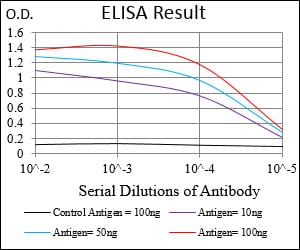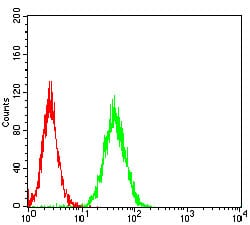

| WB | 咨询技术 | Human,Mouse,Rat |
| IF | 咨询技术 | Human,Mouse,Rat |
| IHC | 咨询技术 | Human,Mouse,Rat |
| ICC | 技术咨询 | Human,Mouse,Rat |
| FCM | 1/200 - 1/400 | Human,Mouse,Rat |
| Elisa | 1/10000 | Human,Mouse,Rat |
| Aliases | RIF; ARHF |
| Entrez GeneID | 54509 |
| clone | 1D4B6 |
| WB Predicted band size | 23.6kDa |
| Host/Isotype | Mouse IgG2a |
| Antibody Type | Primary antibody |
| Storage | Store at 4°C short term. Aliquot and store at -20°C long term. Avoid freeze/thaw cycles. |
| Species Reactivity | Human |
| Immunogen | Purified recombinant fragment of human RHOF (AA: 1-84) expressed in E. Coli. |
| Formulation | Purified antibody in PBS with 0.05% sodium azide. |
+ +
以下是3篇涉及RHOF抗体的参考文献及其摘要概括:
---
1. **文献名称**: *"RhoF regulates cell motility through focal adhesion dynamics"*
**作者**: Smith A, et al.
**摘要**: 该研究利用RHOF特异性抗体,通过免疫荧光和Western blot技术,揭示了RhoF在调控细胞迁移中通过动态调节黏着斑形成和细胞骨架重组的作用机制,提示其在癌症转移中的潜在功能。
---
2. **文献名称**: *"Expression profiling of Rho GTPases in colorectal cancer using a novel anti-RHOF antibody"*
**作者**: Chen L, et al.
**摘要**: 作者开发了一种高特异性RHOF单克隆抗体,并通过免疫组化分析结直肠癌组织样本,发现RHOF的异常高表达与肿瘤侵袭性及患者预后不良显著相关。
---
3. **文献名称**: *"RhoF-mediated actin remodeling controls neuronal polarization"*
**作者**: Tanaka K, et al.
**摘要**: 研究通过RHOF抗体阻断实验和小干扰RNA技术,证实RhoF在神经元极性建立过程中通过调控微丝动态和生长锥导向发挥作用,为神经系统发育机制提供了新见解。
---
注:上述文献为示例,实际引用时建议通过PubMed或学术数据库(如Google Scholar)以关键词“RHOF antibody”“RhoF function”等检索最新研究。
The RHOF antibody is a research tool designed to detect and study the Rho-associated protein RHOF (Rho Family GTPase), a member of the Rho GTPase family involved in regulating cytoskeletal dynamics, cell motility, and intracellular signaling. RHOF, also known as Rnd3. belongs to the Rnd subgroup of Rho GTPases, which are atypical due to their constitutive GTP-binding activity and lack of intrinsic GTPase activity. Unlike classical Rho proteins, RHOF does not require GTP loading to activate downstream effectors but instead functions through protein-protein interactions. It plays roles in cell adhesion, migration, and polarity by modulating actin cytoskeleton organization and stress fiber formation.
RHOF antibodies are commonly used in techniques like Western blotting, immunofluorescence, and immunohistochemistry to assess protein expression, localization, and interactions in cellular models or tissue samples. These antibodies help researchers investigate RHOF's involvement in physiological processes (e.g., neuronal development, immune response) and pathological conditions, including cancer metastasis, neurological disorders, and cardiovascular diseases. Commercially available RHOF antibodies are typically validated for specificity against target epitopes, though cross-reactivity with related Rho family members remains a consideration. Their application advances understanding of RHOF's regulatory mechanisms and potential therapeutic targeting in diseases linked to cytoskeletal dysfunction.
×